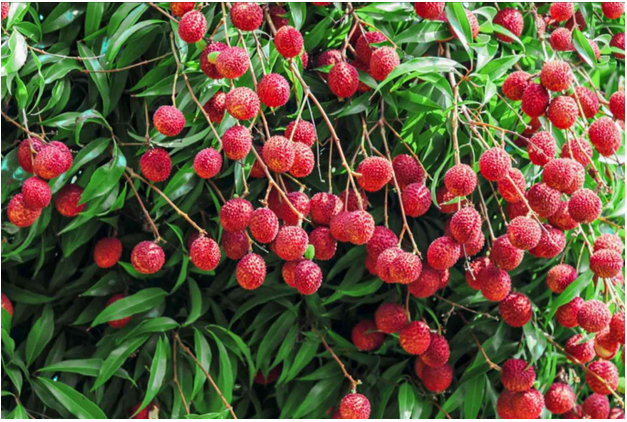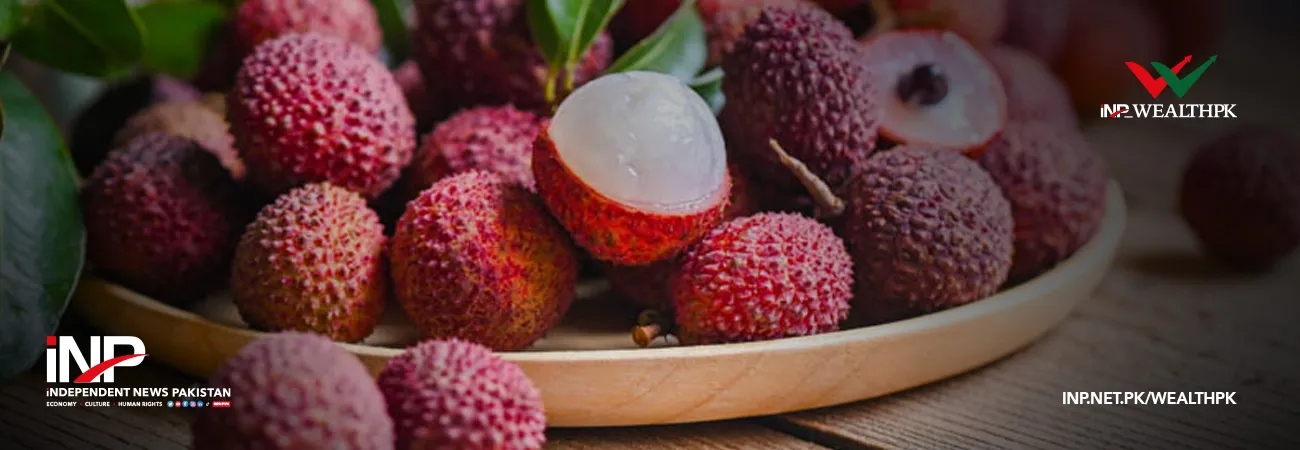آئی این پی ویلتھ پی کے
Muhammad Luqman
The fertile plains in Punjab province, especially around Lahore, are witnessing a quiet yet flavourful transformation, as lychee — once considered an exotic delicacy — is rapidly becoming a cherished part of Pakistan’s fruit basket.

The cultivation of lychee, with juicy, aromatic flesh and vibrant red peel, is thriving in the peri-urban zones of the Punjab capital, particularly along the Sharaqpur Road and adjoining areas. Lychee, native to southern China, was at first grown in this part of the world by a Sikh landlord, Sardar Faqir Singh in 1932, who cultivated a couple of plants in Begum Kot village on the outskirts of Lahore.
However, the cultivation of lychee got boost due to efforts of a farmer, Mehr Khushi Muhammad, who cultivated lychee plants in Saggian, Nain Sukh and Begum Kot areas on the western flanks of the provincial capital. Over the past five decades, the progressive farmers have successfully introduced lychee orchards in the fertile belt around Lahore, adapting them to the regional climate and soil conditions with impressive results.
Now, the summer months — particularly May, June and July — see lychee-laden branches drooping under the weight of ripened fruit, drawing wholesalers, exporters, and curious visitors alike. Despite the encouraging growth, lychee cultivation near Lahore faces threats from rapid urbanisation.
Housing schemes and infrastructure projects are encroaching upon fertile agricultural land, especially along Sharaqpur Road — once famous for its lush lychee gardens. “The lychee orchards are no more in Saggian and Nain Sukh areas. Now you have to travel at least 20 kilometres on Sharaqpur Road to have a glimpse of lychee trees,” said Ahmad Raza Kharal, a Lahore Conservation Society activist.
Talking to WealthPK, he said that unabated urbanisation might completely wipe out the lychee orchards. As the window of crop is not more than two months or so, this is very rewarding crop. The income from an average orchard is usually Rs3 to Rs3.5 million. “The market demand is high, especially from urban centres. A mature tree can produce over 100 kilogrammes of fruit, and buyers are willing to pay premium prices,” said Nabeel Mumtaz, a lychee grower, who owns an orchard on Lahore’s Sharaqpur Road area.
He said that lychee cultivation has also generated job opportunities for the locals as about 70 persons are employed for every orchard, especially during fruition and picking months. According to horticulture experts, varieties like Gola, Surahi and Bedana (some imported, others locally selected) have shown promise under the Punjab climate, especially when given good canopy cover and consistent watering.
“Lychee has proven to be a profitable niche crop for progressive farmers in Punjab, particularly around Lahore, Sheikhupura, and parts of Kasur, Sialkot and Gujranwala districts,” said Dr Nadeem Ahmad, Director of Barani Agriculture Research Institute (BARI), Chakwal. He said that with high market value and growing domestic demand, lychee cultivation is becoming a lucrative option for farmers seeking alternatives to water-intensive and low-profit crops like sugarcane and rice.
Ahmad said that the wholesale markets in Lahore, Faisalabad, and Multan now feature locally grown lychee alongside traditional summer fruits like mangoes, melons, and peaches. Moreover, with improved post-harvest handling and cold chain logistics, the potential for lychee exports is gaining traction. “Exporters are eyeing markets in the Middle East, Europe, and Central Asia, where exotic fruits fetch significantly higher prices,” Ahmad said.
He said that some initial shipments have already made their way to the UAE and Saudi Arabia, showcasing Pakistan’s potential as a lychee-producing country. The BARI director said that the processing of lychees into juice, pulp, and lychee-based desserts is expanding in urban markets, opening up agribusiness opportunities for farmers.
According to agriculture economists, lychee’s inclusion in Pakistan’s fruit portfolio reflects both innovation and adaptability in the country’s agricultural landscape. As consumer preferences shift and global markets diversify, fruits like lychee offer Pakistan an opportunity to move beyond traditional cash crops and toward high-value horticulture.
Credit: INP-WealthPk











